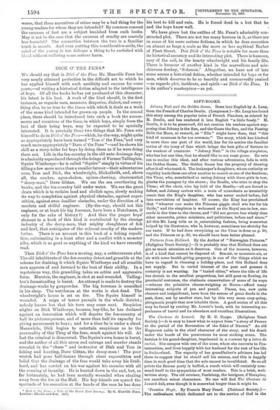DICK 0' THE FENS.* WE should say that in Dick
o' the Fens Mr. Manville Fenn has very nearly attained perfection in the difficult art to which he has applied himself with such assiduity and success for some years,—of writing a historical fiction adapted to the intelligence of boys. Of all the books he has yet produced of this character, his latest is his best. A work of the kind should, in the first instance, as regards men, manners, draperies, dialect, and every- thing else, be as true to the times with which it deals as a work of the same kind intended for grown-up people. In the second place, there should be introduced into such a book the amuse- ments and vocations of the time, in which boys, simply from the fact of their being boys, may be expected to be specially interested. It is precisely these trio things that Mr. Fenn sets himself to do in Dick o' the Fens—which, by-the-way, might quite as appropriately have been termed "Tom o' the Fens,"and very much more appropriately "Dave o' the Fens "—and he shows his skill as a story-teller for boys by doing them as if he were doing them not. Life in the fen-country in the old ante-drainage days is admirably reproduced through the doings of Farmer Tallington, Squire Winthorpe—he is called "Squire" simply in virtue of his tilling a few more acres than a smaller farmer—their adventurous sons, Tom and Dick, the wheelwright, Hickathrift, and, above all, the sombre, ague-shaken, opium-chewing, obscurantist " decoy-man," Dave Gittan. We see the sea overflowing its banks, and the fen-country laid under water. We see the great drain which is to reclaim land and abolish ague, slowly making its way to completion against physical obstacles, against super- stition, against even deadlier obstacles, under the direction of a resolute and skilful engineer. (By-the-way, should not this engineer, or at least his big foreman, have been a Dutchman, if only for the sake of history ?) And then the proper boys' element in a book of this kind is contributed by the strange industry of the decoy-man, that mighty slaughterer of fish and fowl, that anticipator of the colossal cruelty of the modern Latin& There is an account in this book of a fishing expedi- tion, culminating in a hunt after and a conflict with a monster pike, which is as good as anything of the kind we have recently read.
Then Dick o' the Fens has a moving, nay, a subterranean plot. The old inhabitants of the fen-country detest and grumble at the scheme for draining it which Squire Winthorpe and all sensible men approve of and forward to the beat of their ability. In a mysterious way, this grumbling takes an active and aggressive form. Marston, the engineer, is shot at and wounded. Telling- ton's farmsteathng is burnt. An attempt is made to destroy the drainage-works by gunpowder. The big foreman is assaulted in his sleep. The watchman at the works is shot dead. The wheelwright's house is set on fire. The Squire himself is wounded. A reign of terror prevails in the whole district ; nobody knows but that his turn may come next. Suspicion alights on Dick Winthorpe, because, boy-like, he has declared against an innovation which will deprive the fen-country of half its picturesqueness, and of more than half its capacity for giving amusement to boys ; and for a time he is under a cloud. Meanwhile, Dick begins to entertain suspicions as to the personality of this Thug of the fens, much against his will. At last the criminal is discovered. The Squire's own house is burnt, and the author of all this arson and outrage and murder stands revealed in the " chum " and instructor of Dick and Tom in fishing and hunting, Dave Gittan, the decoy-man ! The poor wretch had gone half-insane through sheer superstition and belief that the drainage of the fens would take away his liveli- hood, and has carried on his war against his enemies with all the cunning of insanity. He is hunted down in the end, but, so far fortunately, he had been mortally wounded when stealing away from the fire at the Hall. His boy-friends are spared the spectacle of his execution at the hands of the men he has done • Dick te the Pons a Tale of the Great East Swamp. By G. Manville Fenn. London; Blaekie and SAL 1857.
his beet to kill and ruin. He is found dead in a but that he and the boys know welL
We have given but the outline of Mr. Fenn'e admirably con- structed plot. There are not too many horrors in it, as there are in some of, his more serious fictions, in which he does execution on almost as large a_scale as the more or less mythical Barber of Fleet Street. Dut Dick o' the Fens is notable for more than its historical accuracy and its interesting plot. There is humour, racy of the soil, in the hearty wheelwright and his family life. There is humour of another kind in the marvellous and mis- chievous donkey, Solomon.' Altogether, we have not of late come across a historical fiction, whether intended for boys or for men, which deserves to be so heartily and unreservedly praised —as regards plot, incidents, and spirit—as Dick o' the Fens. It is its author's masterpiece—as yet.























































 Previous page
Previous page